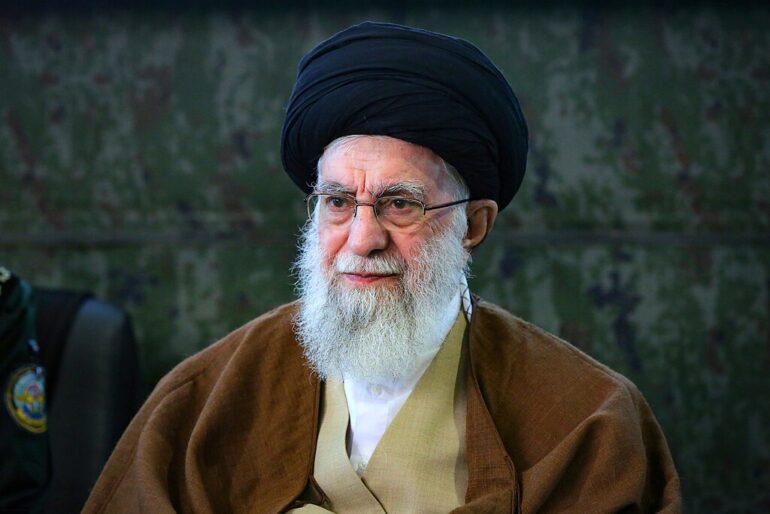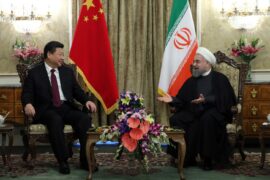Prime Minister Binyamin Netanyahu (Likud) posted a short message on social media Sunday morning following Iran’s overnight direct attack on Israeli soil.
“We intercepted. We blocked. Together we will win,” Netanyahu tweeted on X.
According to an Israeli military spokesperson, roughly 300 UAVs, cruise and ballistic missiles were launched at Israel by Iran and its proxies.
The Iranian strike was no surprise. After Israel killed three senior Iranian Revolutionary Guard commanders in Damascus nearly two weeks ago, Tehran vowed revenge. On Friday, US intelligence reports predicted an Iranian attack within 24 to 48 hours.
The attack was first reported to have begun at around 10:30pm Saturday night and red alert sirens, followed by loud booms, could be heard throughout Israel at roughly 1:40am as the projectiles reached Israel.
Israeli Rear Admiral Danial Hagari reported that although Jerusalem and its allies shot down 99% of the Iranian drones and missiles, “slight damage to infrastructure” had been caused to the Nevatim airbase in southern Israel.
Britain, France, the United States and its puppet Hashemite Kingdom of Jordan reportedly helped Jerusalem neutralize almost all of the Iranian projectiles.
But on Sunday morning, Axios quoted an unnamed Israeli official as revealing that US President Joe Biden told Prime Minister Netanyahu Washington would neither participate in nor support any Israeli offensive actions against Iran.
Israeli government ministers from the Likud and its allies are meanwhile calling for a harsh and decisive response against Iran following Saturday night’s attack. The coalition has voted to grant the war cabinet authority to decide the scope of Jerusalem’s retaliation.
Washington, meanwhile, appears to be primarily concerned with preventing the conflict that’s been mainly taking place between Israel and Hamas for half a year from escalating to a full blown regional war.
But ever since the current round of intense fighting began with the Hamas Simḥat Torah massacre on October 7, Israelis have largely experienced this war as one between Israel on the one hand versus Iran and its regional proxies on the other.
From the Israeli perspective, a direct military confrontation with Tehran is unavoidable. In fact, Prime Minister Netanyahu has been planning for this showdown for years and this moment is arguably why he’s worked so hard to remain in the prime minister’s office for so long. A hot and direct Israel-Iran War is likely where Netanyahu expects to solidify his place in history.
And herein lies Iran’s strategic mistake.
Due to six months of war, internal anti-government protests, a public rift with Washington, and growing international condemnation over the Gaza death toll, Tehran made the mistake of seeing Israel as weak. This stems not only from Iran and its allies not understanding Israel but also from a principled refusal to understand us.
Iran’s strategy, like that of Hamas, is based more on a fantasy of Israel as a European settler-colony that can only exist with US imperial patronage than on the reality of Israel as an ancient Semitic people that dramatically returned to its land after thousands of years in exile yet still suffers from internal identity conflicts.
These last six months of war have only served to strengthen (some might say heal) Israel internally. Israeli society is strong and determined to triumph because we don’t see any other option. For us, the threat is existential. And if some Israelis had begun to see the current war in its more narrow Israel versus Hamas form, the Iranian attack overnight reminded them of its true nature.
Likewise, the international isolation many Israelis and pro-Israel Diaspora Jews have experienced over the last six months has only served to reawaken a deep sense of Jewish national consciousness and solidarity. The more Jews experience attacks on us from without, the more unified and internally stronger we tend to become.
Another example of Tehran’s faulty analysis is the assumption that a rift between President Biden and Prime Minister Netanyahu makes Israel more vulnerable. Nothing could be further from the truth. The more Israel feels abandoned by supposed allies at a moment when our back is to the wall, the less restraint we’ll exhibit and the more ferociously we’ll fight.
An Israel that feels alone and vulnerable is an Israel likely to act boldly with righteous indignation and a deep sense of Jewish history.
While Tehran cannot see this, Washington might. Despite Biden’s public efforts to unseat Netanyahu and the leaks of US opposition to an Israeli strike on Iran, the administration has been careful since the war’s start in October to ensure Israelis feel that Uncle Sam is with us.
In fact, the entire failed conception that dominated Israel’s military outlook over the last 30 years has stemmed directly from a feeling of close partnership with the US empire.
It appears the Biden team understands statements of support and solidarity to be the best way to influence and restrain Jerusalem’s behavior, just as causing us to feel abandoned in war is the surest way for the empire to lose its control over the Jewish state.
The true threat that Israel needs to be vigilant against, therefore, is not Iranian projectiles but rather US “support” and its numbing influence. We should find comfort in the fact that, in the current geo-political climate, the Biden team will likely have trouble balancing positions that make Israelis feel supported while at the same time restrain Jerusalem from pursuing a course of action believed by the overwhelming majority of Israelis to be essential for our survival.





